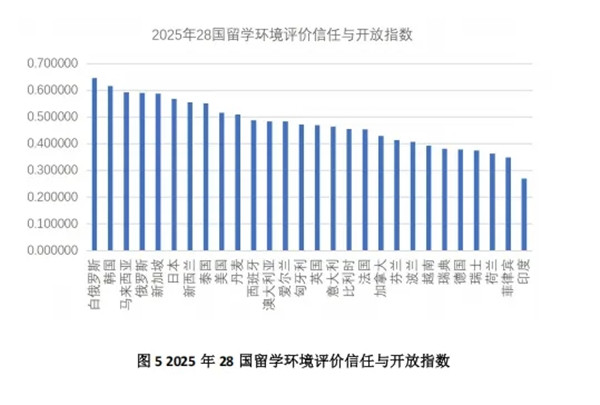【China Daily】Talented foreign graduates like China, but there’s a catch
2018年5月2日
Companies want them, but regulations can be a hindrance to many in search of their dream. Zou Shuo reports.
Universities nation-wide have seen a boom in overseas students in recent years as young people seek to capitalize on the opportunities presented by China’s growing global engagement.
Yet despite the strong demand for such talent among domestic enterprises, strict employment policies mean few foreign students are able to remain after graduation to find work in the country.
Russian student Kira Maksimova, 21, has spent the past four years in Beijing studying for a bachelor’s in business administration at the University of International Business and Economics.
"My plan is to stay in China after graduation, and I already have some offers," she said, adding that she feels the country’s rapid development has brought a lot of opportunities for foreigners looking to work with major corporations.
Student visas allow holders to apply only for internships, paid or unpaid. Maksimova currently works in BOE Technology Group’s human resources department, and she has applied for spots at other companies across the Chinese capital. However, she knows finding a full-time job will be tough.
"I really, really want to work in China, to take advantage of my education background, but I know that many seniors do not get jobs and have to return to their home countries," she said.
The number of foreigners enrolled at Chinese universities has risen almost tenfold from 52,150 in 2000 to 489,200 last year. The nation is Asia’s top destination for international students, with the majority arriving from South Korea, Thailand, Pakistan and the United States, according to the Ministry of Education.
A 2009 poll of overseas students at Peking University found 82.7 percent had chosen to study in the country because they wanted a career related to China, while a survey taken at a 2016 job fair organized by the ministry’s Chinese Service Center for Scholarly Exchange and Peking University found 95 percent of international students wanted a job in China.
Landing a full-time job, however, is easier said than done.
"My feeling is that it’s not difficult to find a job, but not necessarily the one you want," said Italian student Paolo Scroccu. "It’s very easy to find a job teaching English, or something that needs English speaking or writing skills," but that is not his dream career, he said.
He said that, as a sophomore at Tsinghua University’s School of Economics and Management, he is interested in consulting and providing strategies for business development.
"My fluency in several languages, global mindset and previous working experience with a big multinational European company offer me advantages over Chinese graduates," Scroccu said.
Saman Pouyanmehr, a senior at UIBE from Iran, added that the biggest hurdle for foreign jobseekers is the lack of information.
As few job fairs cater to such students, he said most get their information about internships and job vacancies from websites or other classmates.
"There are 100 international students in my class, but only four have found jobs in China," said Pouyanmehr, who has been offering advice to major Chinese companies with plans to expand in the Middle East.

’Cultural bridges’
To qualify for a Chinese work permit, foreign graduates need to have at least two years of post-college work experience-a high threshold, according to Wang Huiyao, director of the Center for China and Globalization(CCG), an independent think tank based in Beijing.
"Basically, many foreign students want to stay in China, but they can’t. If a foreign graduate gets a bachelor’s degree and wishes to stay and find a job, it’s impossible for them to obtain a work permit," he said.
Compared with Chinese graduates of overseas schools who find work abroad, the percentage of international students at Chinese universities that go on to land jobs in China is low, Wang said.
Yet this appears to be a wasted opportunity. With more Chinese enterprises attempting to tap overseas markets, Wang argues that there is massive demand to recruit international students to act as "cultural bridges".
In early 2017, the central government introduced a program to ease the employment restrictions for some foreign students, allowing those with postgraduate degrees or who had attended "well-known" universities to obtain Chinese work permits just a year after graduation.
Candidates must be healthy and have a clean criminal record, a B grade average (or 80 out of a 100-point scale) and a job offer related to their major that pays a salary no lower than the local average, according to a joint circular issued by the ministries of education, foreign affairs, and human resources and social security.
Successful applicants receive a one-year work permit, which can be extended up to five years upon renewal.
Chu Zhaohui, a senior researcher at the National Institute of Education Sciences, part of the Education Ministry, said lowering the employment threshold for foreign students serves the strategy to reinvigorate China’s HR development.
Foreign employees can give domestic enterprises an advantage as they expand overseas, plus it’s only logical that these graduates want to put to practice what they have learned, he said.

Green channel
As it continues to open to the outside world, China is gradually relaxing its residency and employment policies for foreign citizens.
"Green cards" were issued to 1,576 foreigners in 2016, up 163 percent year-on-year, data from the Ministry of Public Security show. A permanent resident’s permit means they enjoy the same rights as Chinese in terms of buying property and sending their children to public schools, among other things.
The country began to ease the requirements for applicants in 2015, a move that has helped attract more overseas talent and boost international exchanges, according to the ministry.
Shanghai received six times the number of "green card" applications in 2016 than it did in 2015, with Beijing witnessing a 426 percent increase over the same period.
Australian student Thomas Linnette described the relaxed policies as a "welcome change" and said he expects there will be a large increase in fresh graduates seeking employment in China. However, he called on the government to go further and scrap the two-year work experience requirement for undergraduate students.
The 21-year-old student from Tsinghua University said he wants to work for a big tech company in China when he graduates in the summer.
"I love China. I have a girlfriend here, and I’m ready to start my life here with her after I graduate this June," he said.
"It will be really inconvenient for me to go back to Australia and work for two years to meet the current requirement for a working visa in China."
Linnette recently finished an internship at consultancy firm KPMG, where he analyzed China’s outbound investment trends. He will soon start another internship at ride-hailing company Didi Chuxing.
"If I start work in China after graduation, my salary will be around A$40,000($30,000) per year, half the amount I would get in Australia," he said, but he still wants to work in China in order to face a different challenge.
"China is growing quite fast, with new and innovative industries springing up every day," Linnette added.
"I want to seize this growth opportunity and grow with China."
From China Daily,2018-4-30






